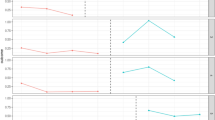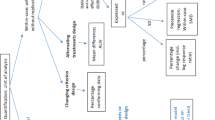Single-Case Designs

Single-case designs (also called single-case experimental designs) are system of research design strategies that can provide strong evidence of intervention effectiveness by using repeated measurement to establish each participant (or case) as his or her own control. The flexibility of the designs, and the focus on the individual as the unit of measurement, has led to an increased interest in the use of single-case design research in many areas of intervention research. The purpose of this chapter is to introduce the reader to the basic logic underlying the conduct and analysis of single-case design research by describing the fundamental features of this type of research, providing examples of several commonly used designs, and reviewing the guidelines for the visual analysis of single-case study data. Additionally, current areas of consensus and disagreement in the field of single-case design research will be discussed.
This is a preview of subscription content, log in via an institution to check access.
Access this chapter
Subscribe and save
Springer+ Basic
€32.70 /Month
- Get 10 units per month
- Download Article/Chapter or eBook
- 1 Unit = 1 Article or 1 Chapter
- Cancel anytime
Buy Now
Price includes VAT (France)
eBook EUR 641.99 Price includes VAT (France)
Hardcover Book EUR 791.24 Price includes VAT (France)
Tax calculation will be finalised at checkout
Purchases are for personal use only
Similar content being viewed by others

Single-Case Designs
Chapter © 2018

Assessing generalizability and variability of single-case design effect sizes using two-stage multilevel modeling including moderators
Article 28 July 2021

A Priori Justification for Effect Measures in Single-Case Experimental Designs
Article 25 March 2021
References
- Ahearn WH, Kerwin ML, Eicher PS, Shantz J, Swearingin W. An alternating treatments comparison of two intensive interventions for food refusal. J Appl Behav Anal. 1996:29(3):321–32. ArticleGoogle Scholar
- Allison DB, Franklin RD, Heshka S. Reflections on visual inspection, response guided experimentation, and type I error rate in single-case designs. J Exp Educ. 1992;61(1):45–51. ArticleGoogle Scholar
- Baer DM. Perhaps it would be better not to know everything. J Appl Behav Anal. 1977;10:167–72. ArticleGoogle Scholar
- Baer DM, Wolf MM, Risley TR. Some current dimensions of applied behavior analysis. J Appl Behav Anal. 1968;1:91–7. ArticleGoogle Scholar
- Barlow DH, Hayes SC. Alternating treatments design: one strategy for comparing the effects of two treatments in a single subject. J Appl Behav Anal. 1979;12(2):199–210. ArticleGoogle Scholar
- Barlow DH, Nock M, Hersen M. Single-case experimental designs. 3rd ed. 2009. Google Scholar
- Barrish HH, Saunders M, Wolf MM. Good behavior game: effects of individual contingencies for group consequences on disruptive behavior in a classroom. J Appl Behav Anal. 1969;2:119–24. ArticleGoogle Scholar
- Brownell KD, Stunkard AJ, Albaum JM. Evaluation and modification of exercise patterns in the natural environment. Am J Psychiatr. 1980;137:1540–5. ArticleGoogle Scholar
- Byun TM, Hitchcock ER, Ferron J. Masked visual analysis: minimizing type I error in visually guided single-case design for communication disorder. J Speech Lang Hear Res. 2017;60: 1455–66. ArticleGoogle Scholar
- Colvin G, Sugai G, Good RJ, Lee YY. Using active supervision and pre-correction to improve transition behaviors in an elementary school. Sch Psychol Q. 1997;12:344–63. ArticleGoogle Scholar
- Dallery J, Cassidy RN, Raiff BR. Single-case experimental designs to evaluate novel technology-based health interventions. J Med Internet Res. 2013;15:e22. ArticleGoogle Scholar
- Dugard P, File P, Todman J. Single-case and small-n experimental designs: a practical guide to randomization tests. New York: Routledge; 2012. BookGoogle Scholar
- Ferron J, Ware W. Using randomization tests with responsive single-case designs. Behav Res Ther. 1994;32:787–91. ArticleGoogle Scholar
- Fisch GS. Evaluating data from behavioral analysis: visual inspection or statistical models? Behav Process. 2001;54:137–54. ArticleGoogle Scholar
- Gast DL, Ledford J. Single case research methodology. 2nd ed. New York: Routledge; 2014. Google Scholar
- Hersen M, Bellack AS. A multiple-baseline analysis of social-skills training in chronic schizophrenics. J Appl Behav Anal. 1976;9(3):239–45. ArticleGoogle Scholar
- Higgins Hains AH, Baer DM. Interaction effects in multielement designs: inevitable, desirable, and ignorable. J Appl Behav Anal. 1989;22:57–69. ArticleGoogle Scholar
- Horner RD, Baer DM. Multiple-probe technique: a variation of the multiple baseline. J Appl Behav Anal. 1978;11:189–96. ArticleGoogle Scholar
- Horner RH, Carr EG, Halle J, McGee G, Odom S, Wolery M. The use of single subject research to identify evidence-based practice in special education. Except Child. 2005;71:165–79. ArticleGoogle Scholar
- Horner RH, Swaminathan H, Sugai G, Smolkowski K. Considerations for the systematic analysis and use of single-case research. Educ Treat Child. 2012;35(2):269–90. ArticleGoogle Scholar
- Jones RR, Weinrott MR, Vaught RS. Effects of serial dependency on the agreement between visual and statistical inference. J Appl Behav Anal. 1978;11:277–83. ArticleGoogle Scholar
- Kazdin AE. Single-case experimental designs: methods for clinical and applied settings. New York: Oxford University Press; 1982. Google Scholar
- Kazdin AE. Single-case research designs: methods for clinical and applied settings. New York: Oxford University Press; 2011. Google Scholar
- Kratochwill TR, Hitchcock J, Horner RH, Levin JR, Odom SL, Rindskopf DM, Shadish WR. Single-case designs technical documentation. 2010. Retrieved from What Works Clearinghouse website: http://ies.ed.gov/ncee/wwc/pdf/wwc_scd.pdf.
- Kratochwill TR, Levin JR. Enhancing the scientific credibility of single-case intervention research: randomization to the rescue. In: Kratochwill TR, Levin JR, editors. Single-case intervention research: methodological and statistical advances. Washington, DC: American Psychological Association; 2014. p. 53–90. ChapterGoogle Scholar
- Ledford JR, Gast DL. Measuring procedural fidelity in behavioural research. Neuropsychol Rehabil. 2014;24:332–48. ArticleGoogle Scholar
- Manolov R, Gast DL, Perdices M, Evans JJ. Single-case experimental designs: reflections on conduct and analysis. Neuropsychol Rehabil. 2014;24(3–4):634. ArticleGoogle Scholar
- Matyas TA, Greenwood KM. Visual analysis of single-case time series: effects of variability, serial dependence, and magnitude of intervention effects. J Appl Behav Anal. 1990;23:341–51. ArticleGoogle Scholar
- Morgan DL, Morgan RK. Comparing group and single-case designs. In: Morgan DL, Morgan RK, editors. Single-case research methods for the behavioral and health sciences. Thousand Oaks: SAGE; 2014. Google Scholar
- Parsonson BS, Baer DM. The analysis and presentation of graphic data. In: Kratochwill T, editor. Single subject research. New York: Academic; 1978. p. 101–66. ChapterGoogle Scholar
- Parsonson BS, Baer DM. The visual analysis of data, and current research into stimuli controlling it. In: Kratochwill TR, Levin JR, editors. Single-case research design and analysis: new directions for psychology and education. Hillsdale: Lawrence Erlbaum Associates; 1992. p. 15–40. Google Scholar
- Putnam RF, Handler MW, Ramirez-Platt CM, Luiselli JK. Improving student bus-riding behavior through a whole-school intervention. J Appl Behav Anal. 2003;36:583–90. ArticleGoogle Scholar
- Rose M. Single-subject experimental designs in health research. In: Liamputtong P, editor. Research methods in health: foundations for evidence-based practice. Melbourne: Oxford University Press; 2017. p. 217–34. Google Scholar
- Schlosser RW, Blischak DM. Effects of speech and print feedback on spelling by children with autism. J Speech Lang Hear Res. 2004;47(4):848. ArticleGoogle Scholar
- Shadish WR, Cook TD, Campbell DT. Experimental and quasi-experimental designs for generalized causal inference. Boston: Houghton Mifflin; 2002. Google Scholar
- Sidman M. Tactics of scientific research. Boston: Authors Cooperative, Inc; 1960. Google Scholar
- Sindelar P, Rosenberg M, Wilson R. An adapted alternating treatments design for instructional research. Educ Treat Child. 1985;8(1):67–76. Google Scholar
- Smith JD. Single-case experimental designs: a systematic review of published research and current standards. Psychol Methods. 2012;17:510–50. ArticleGoogle Scholar
- Stark LJ, Bowen AM, Tyc VL, Evans S, Passero MA. A behavioral approach to increasing calorie consumption in children with cystic fibrosis. J Pediatr Psychol. 1990;15:309–26. ArticleGoogle Scholar
- Wolery M. Procedural fidelity: a reminder of its functions. J Behav Educ. 1994;4:381–6. ArticleGoogle Scholar
Author information
Authors and Affiliations
- Department of Educational Psychology, University of Minnesota, Minneapolis, MN, USA Breanne Byiers
- Breanne Byiers



